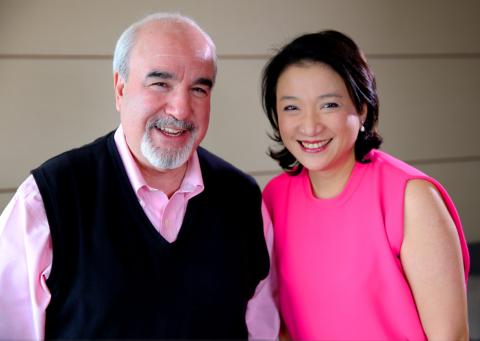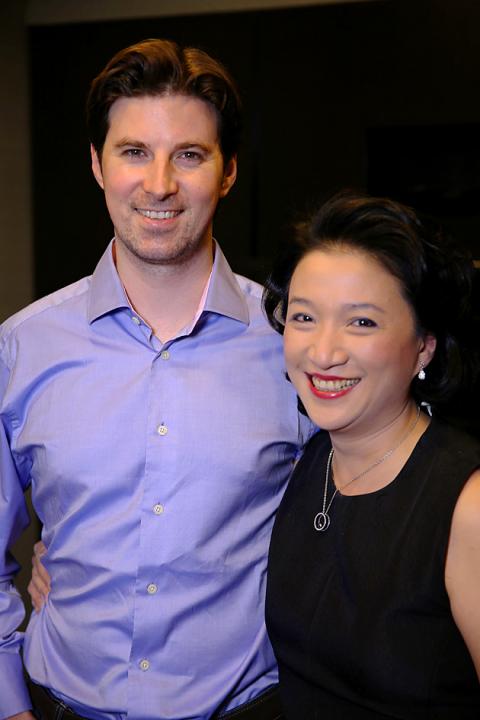Wang Pei-Wen (王貝文), a professional cellist, has embarked on a side career as a YouTube personality.
So far, she has uploaded 20 videos to YouTube, featuring herself interviewing A-listers of the classical music world during their visits to Taipei.
The production formula is simple: meticulous prep, gentle questions in English and a single unrehearsed and uninterrupted take. The resulting conversation has lowlights and highlights, which unfold with minimal editing.

Photo courtesy of Wang Pei-wen
“It’s an honest conversation with the world’s great masters of music and art,” she said.
NEW MEDIA STARS
Wang is joining a new group of entertainers who have turned to YouTube to broadcast original homemade content.

Photo courtesy of Wang Pei-wen
In 2007, YouTube launched its Partners program, which granted select users 55 percent of revenue from ads placed through Google AdSense. The system, which has rolled out gradually to general users, opened the gate to online entertainers like Jenna Marbles, who straight-talks and curses heavily while showing off her two dogs, and Hannah Hart (who cooks while intoxicated on the weekly series My Drunk Kitchen). And a tiny but thriving class of Taiwanese artists have taken to YouTube to build their own brand.
Arial Chen (陳沛靖), a young woman who offers health and beauty tutorials, catapulted to fame three years ago with Make Up for Break Up, a video on fixing up a wan visage.
Tsai Wei-chia (蔡緯嘉), who goes by Tsai A-ga (蔡阿嘎), is about to reach a million subscribers with his campy parodies of politicians and social trends. Some YouTube personalities sing and dance: Teng Fu-ju (鄧福如), better known as A-fu, has parlayed her celebrity as a cover artist into a record deal.
Wang is the first in Taiwan to offer regular in-depth interviews with musicians on tour.
Each episode spans 10 to 25 minutes, spotlighting one artist. The lineup includes childhood idol Christine Walevska; violinist and long-time concertmaster of the New York Philharmonic Glenn Dicterow; violinist and UNICEF Goodwill Ambassador Julian Rachlin; and Daniel Muller-Schott, a German cellist who won the International Tchaikovsky Competition in 1992 at age 15.
PRODIGY
Wang herself was a cello prodigy. Born in Taiwan, she trained in the Ministry of Education’s music program until her teens, when she entered Juilliard, one of the US’ top music schools, to attend its pre-college program. After completing college and graduate studies at Juilliard and Yale, she toured the world as a solo and ensemble cellist.
On the show, Wang does not play music with guests. But her know-how as a musician helps take the conversation on interesting turns, from concert hall acoustics to the poetics of piano pedaling. In addition, musicianship helps her build a quick rapport during interviews.
“Over the years, I saw the ups and downs of musicians, I know about it … how hard it is to make a living. I know how to ask questions,” she said.
Some of the guests are her old acquaintances in the music circles.
An episode that aired on Dec. 10 featured Grammy Award-nominated clarinettist David Shifrin, who teaches at Yale. Cellist Wang Jian (王健), who appeared in an Oscar-Award winning documentary featuring Isaac Stern, was her former classmate.
Since the first video aired last May, Wang’s show has attracted about 11,000 views, mainly from the US and Taiwan, but also from the UK, Germany, Hong Kong and Japan.
She is looking to expand her following: experimenting with length and breaking down a single interview into chapters. She is also working on diversifying content, bringing in not just classical musicians but also masters in jazz and other art forms.
Peiwen’s Note: Conversations with the Masters airs on her channel at www.youtube.com/peiwencello. For more information, visit www.peiwensnote.com.

On April 26, The Lancet published a letter from two doctors at Taichung-based China Medical University Hospital (CMUH) warning that “Taiwan’s Health Care System is on the Brink of Collapse.” The authors said that “Years of policy inaction and mismanagement of resources have led to the National Health Insurance system operating under unsustainable conditions.” The pushback was immediate. Errors in the paper were quickly identified and publicized, to discredit the authors (the hospital apologized). CNA reported that CMUH said the letter described Taiwan in 2021 as having 62 nurses per 10,000 people, when the correct number was 78 nurses per 10,000

As we live longer, our risk of cognitive impairment is increasing. How can we delay the onset of symptoms? Do we have to give up every indulgence or can small changes make a difference? We asked neurologists for tips on how to keep our brains healthy for life. TAKE CARE OF YOUR HEALTH “All of the sensible things that apply to bodily health apply to brain health,” says Suzanne O’Sullivan, a consultant in neurology at the National Hospital for Neurology and Neurosurgery in London, and the author of The Age of Diagnosis. “When you’re 20, you can get away with absolute

When the South Vietnamese capital of Saigon fell to the North Vietnamese forces 50 years ago this week, it prompted a mass exodus of some 2 million people — hundreds of thousands fleeing perilously on small boats across open water to escape the communist regime. Many ultimately settled in Southern California’s Orange County in an area now known as “Little Saigon,” not far from Marine Corps Base Camp Pendleton, where the first refugees were airlifted upon reaching the US. The diaspora now also has significant populations in Virginia, Texas and Washington state, as well as in countries including France and Australia.

May 5 to May 11 What started out as friction between Taiwanese students at Taichung First High School and a Japanese head cook escalated dramatically over the first two weeks of May 1927. It began on April 30 when the cook’s wife knew that lotus starch used in that night’s dinner had rat feces in it, but failed to inform staff until the meal was already prepared. The students believed that her silence was intentional, and filed a complaint. The school’s Japanese administrators sided with the cook’s family, dismissing the students as troublemakers and clamping down on their freedoms — with